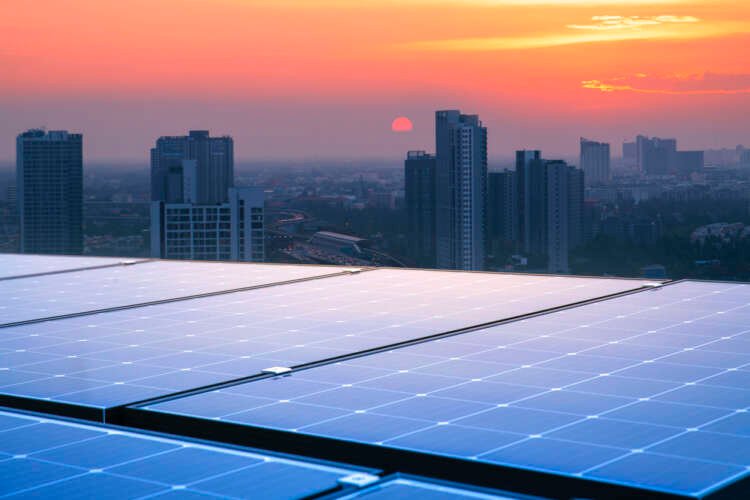Why Businesses Must Embrace Sustainable Solutions to Survive the Energy Crisis


By Simon Kew, Managing Director of Alchemie Technology
Soaring energy prices are in danger of forcing manufacturers to close – particularly in the textile sector. Spiralling costs are putting a strain on businesses, which for many may prove too much to bear.
The price of gas and electricity had been steadily increasing for the last twelve months thanks to a harsh winter across Europe in 2020 and severe global instability in gas-producing regions, which has put increasing pressure on global energy supplies led to low gas reserves. In the UK, we witnessed energy companies going into administration, and consumers got their first taste of the looming crisis when filling stations ran out of fuel and domestic energy bills soared.
The recent Russian invasion of Ukraine has placed further upward pressure on energy process. The wholesale price of European gas peaked at €227 per megawatt hour (MWh) on March 7, up from €16 a year ago. It has since settled down to just over €100/MWh but that is still over five times what manufacturers were paying in 2021.
Many industrial firms and manufacturers were planning their businesses based on fixed-price supply contracts which are expiring and did not factor in the huge energy price increases that they now face. For many the future is bleak. So, what can be done?
Reducing energy consumption is the obvious answer, along with more sustainable approaches It’s the best solution for the environment, it’s also good for the bottom line and is key to long term business survival during these turbulent times.
Many industries are already making huge strides towards sustainability. The automotive sector is forging ahead with electric vehicles. Many motor companies have pledged to stop selling combustion engines within the next decade. Numerous major manufacturers, including Ford, General Motors, and Jaguar Land Rover, signed a COP 26 summit pledge last November to only sell zero emissions cars and vans by 2035.
The construction industry is another example of where energy efficiency is helping to deliver sustainability goals. Sustainable homes can help to reduce peoples’ carbon footprint but also save them money. The same goes for public buildings and infrastructure projects. Schools and hospitals are introducing initiatives like LED lighting, heat pumps and renewable energy sources like solar. Again, this achieves their ambition to reach net zero and reduce costs at the same time.
At the COP 26 climate change conference, in Glasgow, close to 200 countries agreed to urgent cuts to greenhouse gas emissions, to keep 1.5 degrees within reach and to achieve net zero by 2050. However, we now need practical actions and industrial undertakings that can be delivered at huge scale to achieve the industrial revolution needed to eliminate gigatonnes of carbon emissions from the global economic activity.
The key driver of these undertakings is to address climate change – and quite rightly so. But there is also a pragmatic cost-driven business reason for embracing sustainability in the short-term.
Our company creates clean technology for the fashion industry, which is one of the most polluting on the planet. Dyeing and finishing clothes causes 3 per cent of global carbon emissions. Overall, the fashion industry produces more CO2 than shipping and aviation combined. It is also responsible for over 20 per cent of global water pollution.
By switching to new low energy, waterless textile dyeing and finishing technologies, it is possible to make huge energy savings and consequently short-term cost savings whilst at the same time bringing about massive long-term environmental improvements.
At Alchemie Technology, we calculate that the average European textile manufacturer could save €1 million a year, and return immediately to profitability, by switching to more efficient processes which use less energy.
Many businesses are facing the coming year with dread. The destabilising and deeply tragic conflict in Ukraine has only added to a sense of unease about the future. Businesses and consumers are bracing themselves for high inflation and rising costs of living. Companies are also still adjusting to the fallout of Brexit and the after-effects of the pandemic, all within the backdrop of drastically higher energy costs.
Businesses which previously ignored sustainability can no longer turn a blind eye. What seemed like high-minded COP26 pledges are now an economically driven necessity. Embracing more low energy, low carbon technologies has become critical to reducing costs and ensuring business survival.
The spin off benefit is that these more sustainable solutions will also reduce our carbon footprint and help companies reach net zero along the way. Energy-efficient solutions will reduce business costs and keep companies in profit.
Sustainability is no longer considered an additional cost that must be absorbed to meet ESG targets and the exclusive focus of environmental groups. It is now a business imperative to reduce cost and maintain competitiveness, and a practice that should be adopted on a widespread scale to preserve the planet as we know it today.
Sustainability refers to the practice of meeting present needs without compromising the ability of future generations to meet their own needs, often focusing on environmental, social, and economic dimensions.
Energy efficiency is the goal of reducing energy consumption while maintaining the same level of energy service. This can be achieved through technology improvements and behavioral changes.
Renewable energy is energy derived from natural processes that are replenished constantly, such as solar, wind, hydro, and geothermal energy, providing a sustainable alternative to fossil fuels.
Climate change refers to significant changes in global temperatures and weather patterns over time, primarily driven by human activities such as burning fossil fuels, deforestation, and industrial processes.
Explore more articles in the Business category











